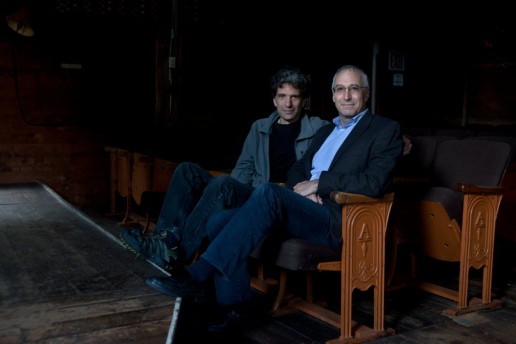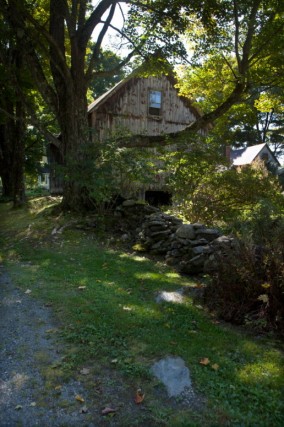Mental Notes (photographs by Nan Coulter)






FD, the lifestyle magazine of the Dallas Morning News, profiles Yellow Barn's Artistic Director, Seth Knopp, who also serves as Artistic Director of Soundings: New Music at the Nasher. Now in its fifth season, Soundings is the cornerstone of an ongoing collaboration between the Nasher and Yellow Barn.
View the printed version of this article as a PDF
If you put together the words serious music and Dallas, the first things you may think of are the Dallas Symphony Orchestra in the acoustically perfect Meyerson, or the Dallas Opera in the lipstick-red Winspear.
Try to think a little differently.
You can be in the Arts District and skirt the glamour of the big venues and their more traditional programming. Seth Knopp, of the chamber music and piano faculties of the Peabody Conservatory of Johns Hopkins University in Baltimore and of the Yellow Barn Music School and Festival in Putney, Vermont, is a pianist. He is also a distinctly un-Dallas-like fellow. Soulful, Jewish, intellectual: He’d be more at home on Manhattan’s Upper West Side or in Brooklyn than in Dallas’ glitz. But since 2010, Knopp has been the man behind the most innovative, quirky music series in this city. Soundings: New Music at the Nasher blends the tried and true with the avant-garde — and it continues to play to packed houses. In November, the superb young cellist Alisa Weilerstein played solo works by Bach and then 20th-century masters. This month, and in April and May, “Music From Yellow Barn” will involve percussion and string quartets, the harmonious and the dissonant.
Knopp, 55, grew up in Madison, Wisconsin. His father, a math professor, was besotted with music; his mother was an amateur pianist. He studied with the master pianists Leonard Shure and Leon Fleisher and, while in Philadelphia, played classical cocktail piano at a restaurant near the University of Pennsylvania campus. By 1987 he was ensconced in Baltimore; in 1998 he took over Yellow Barn. The center for chamber-music study and concerts was founded in 1969, and now hosts more than 4,000 people who come to hear more than 100 musicians yearly. Just last month, Yellow Barn was presented a prestigious honor, for the second time, with a telling name: the Adventurous Programming Award from Chamber Music America and the American Society of Composers and Publishers. All this — plus classes, studios, workshops and residencies — amid 100 rolling, idyllic acres in southeastern Vermont. (Yellow Barn’s eight studios are there on the campus of the Greenwood School, for boys with dyslexia and other learning differences. It also makes use of the Big Barn performance space, in downtown Putney, just three miles away.) Knopp is Yellow Barn’s artistic director.
He certainly obsesses over music. “One reason to do [it],” Knopp says, “is to understand life better and to bring you in touch with other people. But it’s also a fact that music is a window to the world.” That missionary zeal is part of what brought Knopp together with Jeremy Strick, the director of the Nasher Sculpture Center. Yellow Barn and Nasher patrons Charles and Jessie Price — the music supporters keep a low philanthropic profile in Dallas, very much off the radar — made the connection. “I indicated,” says Strick, “that we needed a brilliant programmer to organize” a new-music program. “Charles suggested Seth, whom he’d met years earlier when Seth performed in a concert at the Nasher.” When Soundings began, both Strick and Knopp had no idea whether people would come. Now, the 200-seat Nasher auditorium, about the size of Yellow Barn’s main Big Barn performance space, is usually sold out for each program, well in advance. The concerts, says Strick, “engage and challenge audiences in [the Nasher’s] intimate space — something Dallas is clearly eager to experience.” No matter where it’s heard, Knopp is building audiences and making people realize there is no reason to fear new music. In fact, he doesn’t think about his programs geographically: His only goal is that the performers and their audiences “lose themselves in their listening.” He says he loves the Texas openness about collaborations between groups, the cross-pollination that comes out of — and then feeds back into — a sense of community. A different kind of community is, of course, the very essence of the chamber works and other small groupings that the Nasher presents, nothing so large as a full-scale orchestral program. For Knopp, acutely alert to the transcendent power of music, the greatest pleasure comes in these small groups. What he likes best is working with singers, and in May he will collaborate with the soprano Lucy Shelton in a performance of Arnold Schönberg’s 1912 Pierrot Lunaire, on a program that will also include theater and cabaret songs by Kurt Weill and Bertolt Brecht.
Yet for all the public aspects of music and music-making, Knopp remains, like many performers, instinctively private. For the public, he relishes performing Beethoven — but in the solitude of his own room, it’s Bach and Chopin. He performs and has teaching residencies all over: Toronto, Austin, Chicago and Washington state have been recent stops. At home in Baltimore, he administers, creates programs and works with chamber ensembles and pianists at Peabody. I ask how long he can go without practicing, especially when he’s on the road. Three days without playing for himself, he says, induces twitchiness. “Practicing becomes a home. It’s not a chore. It’s where you find yourself. When I’m at the piano, I know that’s where I’m meant to be.”
By Willard Spiegelman
